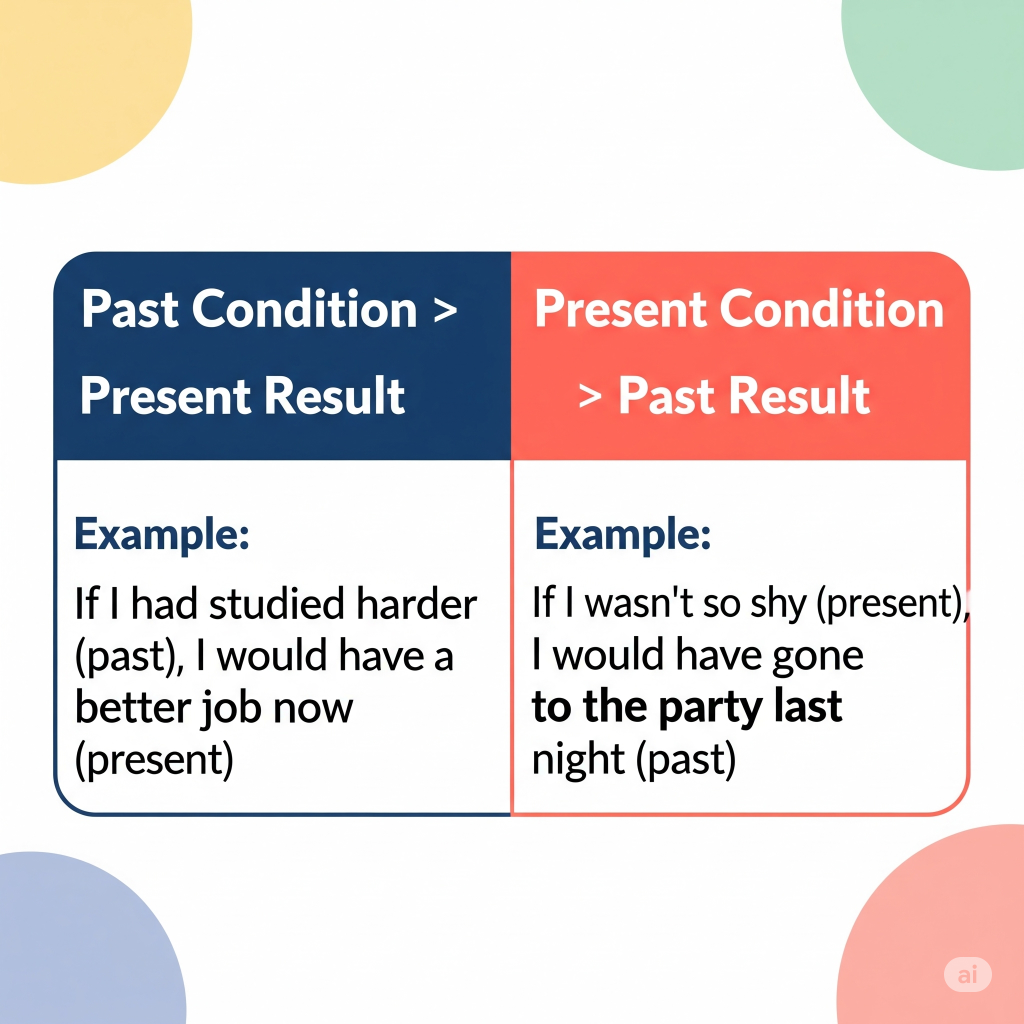“If I had studied harder, I wouldn’t be Googling ‘What are mixed conditionals?’ right now.”
Boom. You just used a mixed conditional. And probably didn’t even realize it. That’s the magic (and pain) of this topic: you’re using it wrong before you even know what it is.
So let’s fix that, shall we?

So… What Are Mixed Conditionals, Really?
Mixed conditionals are what happens when English grammar goes, “You know what would be fun? If we mashed past and present together like two socks that don’t match.”
Unlike regular conditional sentences, which stick to one timeline, mixed conditionals break the rules. They’re the rebellious teenage phase of English grammar.
You mix a condition from one time (say, the past) with a result from another (like the present), and suddenly your sentence has emotional baggage.
Types of Mixed Conditionals (aka The Chaos Menu)

1. Past Condition → Present Result
- Structure: If + past perfect, would + base verb
- Example: If I had learned to code, I’d be working at Google now.
- Translation: I didn’t. So I’m here. With you. Writing this.
2. Present Condition → Past Result
- Structure: If + simple past, would have + past participle
- Example: If I were smarter, I wouldn’t have eaten gas station sushi.
- Lesson: Your current traits can still ruin your past decisions. Yay.
Where Mixed Conditionals Show Up (Spoiler: Not Just in Exams)
Yes, they’re in IELTS and TOEFL—duh. But they’re also lurking in:
- Casual conversations:
If I had gone to bed earlier, I wouldn’t look like a zombie now. - Professional emails:
If our team were more responsive, we wouldn’t have missed the deadline.
(ouch) - Writing that isn’t basic:
Like, if you’re done with baby steps, read our post on advanced grammar tips. Then come back and mix tenses like a boss.
Mixed conditionals are also grammar gold in academic writing, speeches, essays, and TikTok videos that try to sound philosophical.
Examples You’ll Actually Understand
- If I had taken the train, I would be on time now.
→ Past choice + present consequence - If she were taller, she would have reached the top shelf.
→ Present state + past frustration - If I hadn’t read that book, I wouldn’t sound this pretentious.
→ And yet here we are.
These aren’t just grammar exercises. They’re life’s regrets… dressed up in perfect syntax.
Mistakes That Make Me Cringe (So You Don’t Have To)
❌ If I have studied, I will be prepared.
✅ If I had studied, I would be prepared.
❌ If she was careful, she wouldn’t have broken it.
✅ If she were careful, she wouldn’t have broken it.
(Yes, it’s “were.” No, we’re not arguing about this.)
Still stuck with sentence basics? Might help to review simple subject rules before you dive into time-bending conditionals like this.
And if you’re still saying “have went” or “did wrote,” you may want to pause here and take a detour to our grammar checker. Seriously. I’ll wait.
Why Bother With Mixed Conditionals?
Because sounding fluent isn’t just about using idioms like “raining cats and dogs.” (Though if that’s your thing, here’s a post about idioms you’re probably not using right.)
Mixed conditionals allow you to:
- Express regret (If I had eaten less pizza, I wouldn’t be this bloated now.)
- Critique behavior (If he were more attentive, he wouldn’t have messed it up.)
- Explore hypotheticals (If I had been born in the 1800s, I’d probably still be correcting people’s grammar.)
They’re also a must for rewriting ideas with nuance. Need to do that professionally? Read our guide on paraphrasing effectively without sounding like a confused thesaurus.
Call to Action (Because I’m Contractually Obliged)
Go on. Craft your own mixed conditional sentence and drop it in the comments.
Try something like:
If I had read this blog post earlier, I wouldn’t have butchered that IELTS writing task.
Or:
If I were more consistent, I would have finished my grammar workbook before 2027.
And hey—if writing’s your thing, maybe you’d also enjoy our post on semicolons, colons, and dashes. Because nothing says “I understand punctuation” like a well-placed em dash.
FAQ (Because People Keep Asking, and I’m Tired)
1. Are mixed conditionals only for exam essays?
No. They’re used in everyday speech, movies, job interviews, and awkward apologies. Basically anywhere English is trying to express “what could have been.”
2. Can I mix second and third conditionals however I want?
Technically yes. But if your timelines don’t match, you’ll sound like a time traveler who forgot how causality works.
3. What’s the deal with “were” in conditional sentences?
Use “were” for all subjects in unreal conditionals: If I were, if she were, if your cat were president… That kind of thing. The Oxford Learner’s Dictionary confirms I’m not making this up.
4. Is there a tool that checks this stuff?
Yes. Ours. Use the Fixy Grammar Checker or Paraphraser when your brain hurts.
5. How can I practice?
Take real situations from your life and reframe them.
Past + present. Present + past. A little regret. A sprinkle of drama. Voilà—you’re fluent in misery… I mean, mixed conditionals.
If you had read this whole blog post carefully, you would already know how to flex these grammar moves like a pro.
But if not, scroll back up. I’ll be here. Judging silently. 😊
